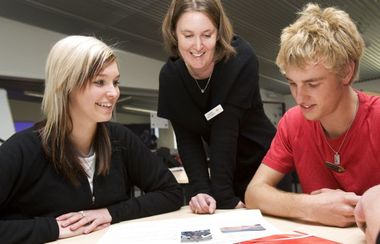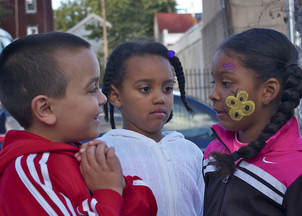 My mom is a teacher. My aunts and uncles are teachers. I married a teacher, and then I became one myself. I also have two children in public schools, and as they enter their high school years, I am even more thankful for the contribution teachers make daily to the lives of children. Almost without exception, every teacher I know believes his or her job is a higher calling. They take seriously their mission to prepare their students for whatever comes next, whether it’s first grade or the first year of college. The teacher’s job is not an easy one, but it is a very important one. It is not, however, the most important influence in a child’s life. Without a doubt, teachers play a critical role in the education and development of young people. However, parents are their children’s first and most influential teachers—for better or for worse. The lessons learned in the first few years of life can determine a child’s success in school, whether that school is public, private, or conducted at home. The lessons learned in childhood and adolescence can determine whether that child matures into an adult who contributes positively to the world or one who asks that the world contribute to him or her instead. Study after study has found that home factors, including parental literacy, a dependable and trustworthy support system, physical health, and appropriate relationships and role models, have as much to do with student success as anything that happens in the classroom. Parents are their child’s first teacher, and the lessons imparted by parents stick with their kids for many, many years, says Meredith McClendon, a certified parent educator with the Parents as Teachers affiliate in Talladega, Ala. McClendon says that because parents have tremendous influence even before a child is born, parental engagement is critical from the very beginning. Though engagement certainly includes activities like reading and talking to a child, it encompasses so much more. Every experience, whether kicking a soccer ball or folding washcloths, teaches a child. Every task a child accomplishes gives him or her a little more confidence for the next task. That’s the key problem with so-called helicopter parents, those who protect and help so much that their children don’t learn for themselves. But what about those young people who have to learn so much independently? Those whose families struggle to put food on the table and gas in the car? Most of their parents desire a better future for them, but it’s hard to be engaged at school when you work 8-5 at a manufacturing plant. Teachers seldom have free time in the morning, and few want to hang around hours after the school bell rings. The parents may be trying their best, as are the teachers, but there’s another piece of the puzzle that can perhaps mean the difference between success and failure—the family of faith. Just as studies have shown that home factors play a tremendous role in student success, community resources like caring neighbors, creative opportunities, and religious participation have also proven influential. Church programs like after-school tutoring or literacy missions are one way to reach students and their families. But even Sunday School teachers, pastors, and other caring adults in a congregation can provide an additional avenue of encouragement and support that struggling students need. Think back to when you were young. Who was that encourager whose kind words motivated you to do better? Will you ever forget their kind words, their belief in your ability to achieve your goals? We all have within us the power to be that person in a young life. As believers in Jesus, we have the ultimate encourager on our side. Time and time again, God sends a word to His people: Do not fear. That’s the message young people in our church, whether their parents come with them or not, need to hear from us. Fear is a powerful motivator, and most of us, if we’re honest, struggle to fight our fears. Our children may have different fears, but they too struggle to see the brighter outcome. For students who come from difficult family circumstances, fear may not be confessed, but it is certainly present. The PBS NewsHour featured a special weeklong series last week Monday called “Rethinking College.” In the first installment, NewsHour reporter Hari Sreenivasan interviewed two students from low-income homes. Both expressed their fears of college. (Hint: They weren’t about passing tests.) Here’s what one said: “Being able to confidently walk around campus knowing what I want to do, being able to just talk to a professor and ask them for something. I think that is super scary.” Another student said this: “You just sometimes feel like you are not adequate. And I think it’s really important to tell you that you are adequate. You do have all the skills that everyone else does. You just have to believe in yourself.” We need to teach our children and our “church children” that they are more than adequate, not because of anything they have done or will ever do, but because God created them in His image and because Jesus died for their sins. We must teach them to trust Jesus first and regularly reinforce to them that their identity is in Him—regardless of academic, social, athletic, or professional success. As Paul writes “as we have opportunity, let us do good to all people, especially to those who belong to the family of believers” (Galatians 6:10). This goes for everyone in our family of faith—adults, teens, and children alike. Teachers can tell their students they are adequate and prepare them with the skills they need. But those words carry more weight when they come from a parent. They carry lasting weight when they know the one who speaks them is speaking in love. The good news is that it’s never too early or late to begin. If you are the parent of a child in school, get involved now. Before you drop your children off at school every day, pray for them. Pray with them. If you can, volunteer at their school or have lunch with them a couple of times during the year. Join the PTO. Pin up what your child brings home from school. Let your child know that you believe education is important, but more importantly, let your child know you believe he or she is important. More importantly, teach your child that God has placed a “holy calling” on their lives. They may be carpenters, doctors, palaeontologists, or architects, but God has placed that desire in their hearts, and He will use their work for His glory. That’s my prayer for my children…. Won’t you join me in praying that for your children as well?  Did you do anything fun this weekend? It's a simple question, but it made all the difference for my daughter Monday morning. Last week I wrote about her rough first day of school. The second day was better (no tears, thankfully), but she was still concerned about making new friends. So my husband and I went Old School. We talked about looking outside ourselves and engaging others in conversation, along with some blah-blah that we parents are so good at. We encouraged her to ask a single question to someone sitting near her: How was your weekend? Everybody likes talking about themselves. It will work, we said. Guess what? It did. She came home bubbling with excitement to tell us that she had asked seven people about their weekends. Every time she asked the question, she had had a brief conversation with someone new, and one girl seemed very promising as a new friend. The conversation starter question was a huge success. It's hard to see our kids struggle, but when they do, it's up to us to give them the tools they need to get past the obstacle and face their fears head on. It's our mission, after all. These tools are even more important for this generation who often communicates in text messages or via social media. They need to be reminded that we all need eye-contact. We all need a smile or a nod that lets us know someone is listening to us. No matter how technology changes, conversation isn’t going away anytime soon. So if your child is struggling to make friends in a new school or a new activity, offer these suggestions as conversation starters:
 My son could not wait until the first day of school. He didn't care what clothes he wore or how he would get there. For him, the first day of this school year was just like the last day of last year--another day to hang out with his friends. I never had that kind of enthusiasm for first days. The transition from elementary to high school was painful. I arrived at a new school with no old friends. For an extremely shy and anxious kid, that school year loomed long and lonely. Starting college six years later, I went through the dreaded first days again. Most freshman gain weight when they get to college. I, on the other hand, lost 15 pounds because not even McDonald's finest fries could slip through the lump in my throat that first semester. Even now, I can't think of those days without deep, deep sadness. So when my sweet girl burst into tears as soon as the car door closed yesterday, lots of emotions starting churning inside this momma who knows all too well how hard it can be to begin again alone. The timing of the summer movie "Inside Out" couldn't have been better for the two of us. While we didn't move, my daughter's best friend did. So yesterday, as teacher after teacher called out her friend's name, my girl was reminded over and over that someone special was missing whose very presence could have made this day just a little brighter. Sadness certainly sat at the controls yesterday. I'm glad to see all the reports of great first days yesterday--really, I am. I don't wish any child the pain of spending a day on the verge of tears because they feel so alone they want to disappear for real (you know, because they're already invisible). But her day was anything but great, and today may not be any better. It's not all bad news though. She is strong and courageous, and she headed out the door today with an attitude that quietly insisted "let's get this done." Will be it be a "great" day? Probably not. Will she get through it? Absolutely. Today. Next week. First semester. The whole year. She will survive and thrive because she knows who she is and Whose she is, regardless of the circumstances. Change is inevitable. Transitions are part of life. They stretch us. They show us what we're made of. We feel their pain, and ultimately, we realize their gain. This morning, as I always do, I encouraged both my kids to notice those around them. Though my daughter didn't really believe it, someone in her class is probably hurting more than she is. In the hall, in band, in the lunchroom, or on the bus, there is someone who needs a smile and a kind word. I regularly tell my kids that I would much rather they be remembered for their kindness to others than for any academic or extracurricular accolades. Coming from someone who long thought her only value was in what she could achieve, I hope that message sticks with them. If you're reading this and have influence over a child, I hope you will share that message with them as well. When Joy is at the wheel, share that with someone who is overwhelmed with Sadness. They may not be able to tell you thanks, but it will make all the difference. |
About MeI am a regular contributor to The Alabama Baptist newspaper, and I also write and edit for several religious, business and educational outlets through my business, McWhorter Media and Marketing.
One of the greatest privileges of being a writer is the opportunity to share the stories of others with a larger audience. I love to do that! Sharing my own stories is much more challenging, though no less important to making sense of the challenges of Faith and Family in everyday life. Thanks for joining me on this journey! Please feel free to contact me if you have questions or suggestions. Contact Carrie If you would like to receive new posts, I invite you to follow me on Twitter @CarrieMcWhorter or use the contact form to send me a newsletter request. Archives
March 2017
Others I'm following...Categories
All
|
